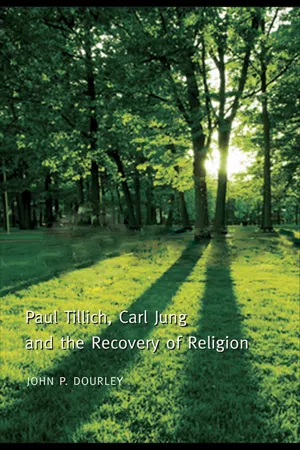
- 216 pages
- English
- ePUB (mobile friendly)
- Available on iOS & Android
Paul Tillich, Carl Jung and the Recovery of Religion
About This Book
Is religion a positive reality in your life? If not, have you lost anything by forfeiting this dimension of your humanity?
This book compares the theology of Tillich with the psychology of Jung, arguing that they were both concerned with the recovery of a valid religious sense for contemporary culture. Paul Tillich, Carl Jung and the Recovery of Religion explores in detail the diminution of the human spirit through the loss of its contact with its native religious depths, a problem on which both spent much of their working lives and energies.
Both Tillich and Jung work with a naturalism that grounds all religion on processes native to the human being. Tillich does this in his efforts to recover that point at which divinity and humanity coincide and from which they differentiate. Jung does this by identifying the archetypal unconscious as the source of all religions now working toward a religious sentiment of more universal sympathy. This book identifies the dependence of both on German mysticism as a common ancestry and concludes with a reflection on how their joint perspective might affect religious education and the relation of religion to science and technology.
Throughout the book, John Dourley looks back to the roots of both men's ideas about mediaeval theology and Christian mysticism making it ideal reading for analysts and academics in the fields of Jungian and religious studies.
Frequently asked questions
Information
Table of contents
- Cover Page
- Title Page
- Copyright Page
- Preface
- 1 Toward a salvageable Tillich: the implications of his late confession of provincialism
- 2 The problem of essentialism: Tillich’s anthropology versus his Christology
- 3 Christ as the picture of essential humanity: one of many
- 4 Tillich on Boehme: a restrained embrace
- 5 The Goddess, mother of the Trinity: Tillich’s late suggestion
- 6 The problem of the three and the four in Paul Tillich and Carl Jung
- 7 Bringing up Father: Jung on Job and the education of God in history
- 8 Memory and emergence: Jung and the mystical anamnesis of the nothing
- 9 Tillich’s theonomous naturalism and its relation to religious and medical healing
- 10 Jung, Tillich and their challenge to religious education
- 11 Tillich, Jung and the wisdom and morality of doing science and technology
- Afterword
- References